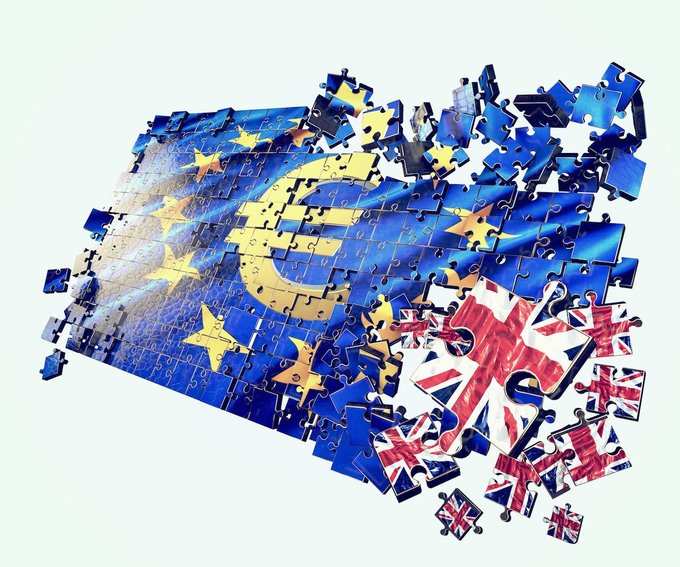 As Britain holds a referendum today, everyone's talking about the pros and cons of both the probabilities - whether it remains a part of the European Union or leaves.
As Britain holds a referendum today, everyone's talking about the pros and cons of both the probabilities - whether it remains a part of the European Union or leaves.ALSO READ: LIVE: BRITAIN IS ABOUT TO VOTE IN THE HISTORIC EU REFERENDUM
Notably, the British Prime Minister David Cameron had promised a referendum on this issue during his election campaign back in 2015. He felt that the EU had gradually evolved into a powerful bureaucracy that was infringing on British sovereignty and issues of national importance such as trade, labour immigration, financial and labour regulations, and social spending.
Going back to a few major reasons that triggered Brexit:
Net Contributor-The UK is a net contributor to the EU budget around 8.5 billion pounds per year.
Immigration-The EU’s rules on free movement of labour have led to addition of 285,000 people each year (an increase of 0.4% in population) for the last 3 years which is creating social problems for Britain.
Red Tape – Some of the EU rules such as maximum work hours of 48/week, same working conditions for full time and part time employees, apply to small businesses. This creates a large hole in their balance sheets.
Although the vote is not binding, the possibility of Brexit creates a lot of uncertainty for the EU. It can significantly impact trade, investment and economic growth in the region and weaken the bloc’s effectiveness.
Escalating Brexit Fears
The Brexit polls have drawn significant attention in the financial markets for the past 3 months. Over the last 2 months, the 10-day moving average of Brexit polls has been increasing. Around the first week of June, Brexit fears escalated to such an extent that the Brexit polls trend line moved above the Bremain polls trend.
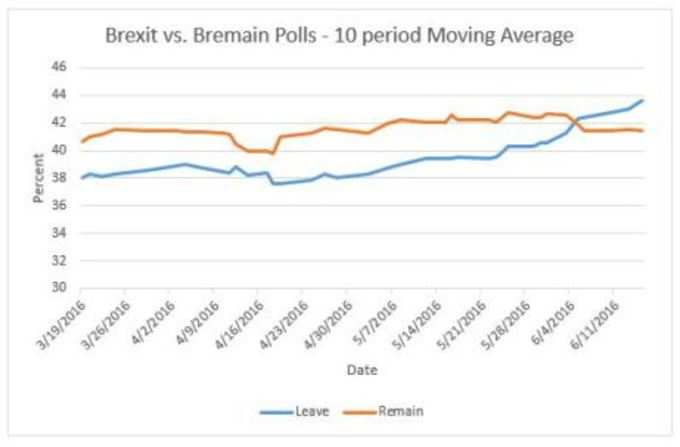
(Source – Bloomberg)
Current Market Perception
Volatility has increased in the markets and investors are being more concerned. Here's how:
1) Libor – OIS Spread : As the uncertainty increases, LIBOR increases as banks will be skeptical to lend. The OIS is the overnight rate and hence can be considered to be almost risk free in the UK’s case. The greater the spread (difference), the more the uncertainty. While the LIBOR-OIS spread has been fairly consistent around the world, the UK LIBOR-OIS spread has widened starting mid-April. This indicates rising concerns for the UK’s economy.
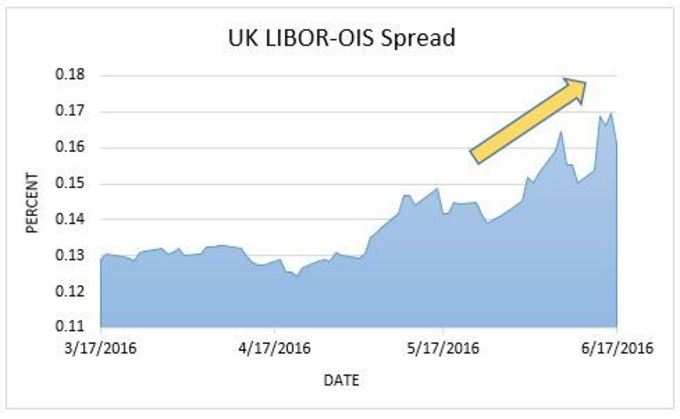
2) GBPUSD (3 month option) volatility and FTSE 100 Vol index – In anticipation of Brexit, the markets saw significant pressure in the GBPUSD currency pair and FTSE 100 Index. This is evident from the spurt in the 3-month GBPUSD Vol and FTSE 100 Index Vol around the first week of June.
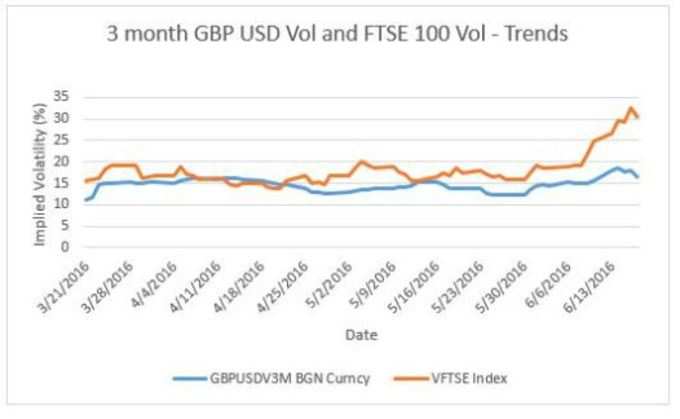
(Source – Bloomberg)
Movements across Major Asset Classes
This is clearly a risk-off situation. In a risk-off scenario, investors are expected to move from risky assets towards safe haven assets. The appreciation in safe haven assets has been significant over the last 2-weeks which coincides with the escalation of Brexit fears. This is complemented by an outflow of funds from the UK FTSE Index.
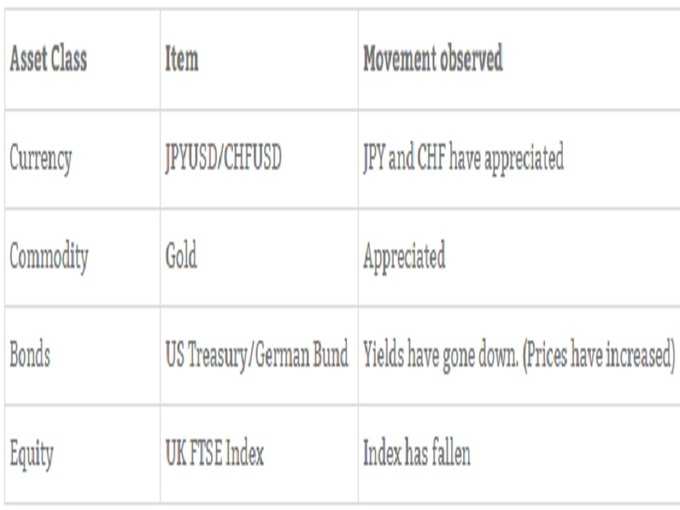
Note – The graphs below have been adjusted to a base of 100 as on 17/3/2016. Hence, a value more than 100 means that respective asset is appreciating.
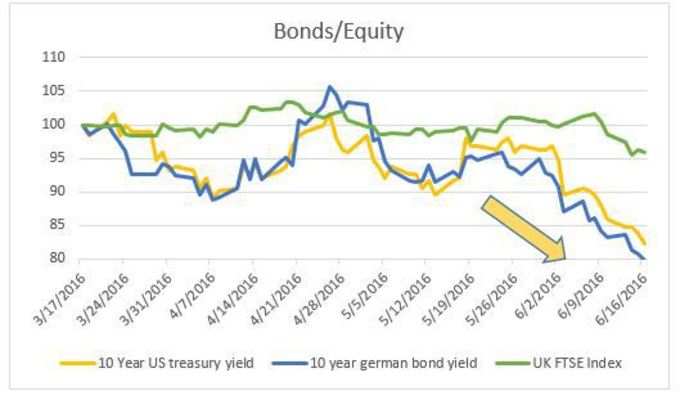
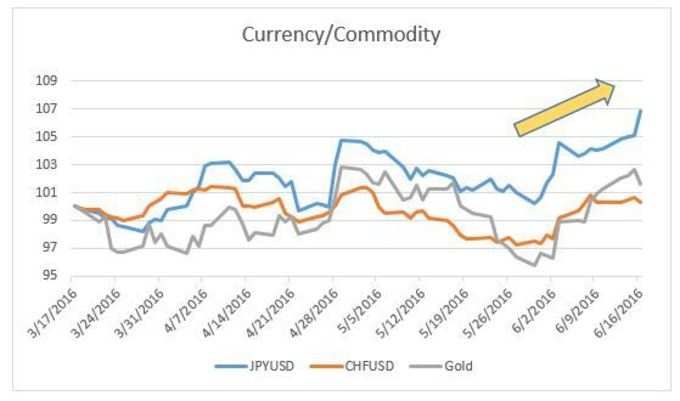
(Source – Bloomberg)
Implications of Potential Brexit
1) Trade Impact
45-50% of the UK exports go to the EU. Additional tariffs will be imposed with the main implications being on the automobile and aircraft sectors. The uncertainty regarding the trade model that Britain will follow – the Norwegian, Swiss, WTO models or create its own model – is what is concerning Global CEOs. (Click Here To Know More (Page 6))
2) Financial Impact
Uncertainty around the UK’s trading regime is likely to defer investment decisions and limit household spending. Brexit will impact both Britain and the EU. We expect the BOE and the ECB to ease rates and initiate some temporary liquidity programs to induce growth.
On the currency front, GBPUSD is expected to depreciate by around 15 -20%. Current account deficit of 7% of GDP and potential reduction in foreign direct investment are the major factors that might amplify currency depreciation.
3) Chain Reaction
We expect David Cameron to resign because he firmly wants Britain to stay in the EU as it will help in maintaining its economic relations with the rest of the world. It is expected that other countries such as Denmark, Spain and Portugal might not hold referendums to exit, but hold referendums against specific EU clauses, thereby aggravating problems for the EU.
(All the views expressed are opinions of Punit Parekh, Shreya Aggarwal and Dinkar Mohta – Finance club members at IIM Bangalore)
